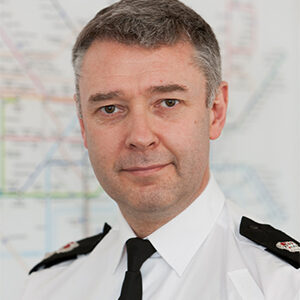EBP Hall of Fame
Mark Newton
Inducted June 2012
Nominated by Barak Ariel, Cambridge University and Lawrence Sherman, University of Maryland and Cambridge University
Biography:
Mark Newton is currently the Assistant Chief Constable for B Division and Crime for the British Transport Police (BTP). He has previously had command of the Force’s two biggest Areas and for the Corporate Resources delivery for the Force, delivering, amongst others, People Services, Technology, Justice, Custody and Estates. Mark has 31 years of policing experience, which commenced in 1982 in Hertfordshire Constabulary and latterly in British Transport Police. He has been with the British Transport Police since 2007.
He has experience in leading covert policing teams and has been a Senior Investigating Officer for several murders. Mark has a Master’s Degree in Business and leads for Creativity and Innovation within BTP.
Evidence-Based Research and Practice:
Assistant Chief Constable Newton is recognized for facilitating the United Kingdom’s first randomized controlled trial on hotspot policing. In collaboration with Cambridge University, this experiment tested directed police presence in the London Underground’s hottest 100 platforms. This experiment is the first time that proactive and structured patrolling of the tube platforms was delivered in this matter, since the Tube was opened more than 120 years ago.
The six-month experiment produced a series of important findings. Officers were directed to attend their assigned hotspots for fifteen-minute “Koper Curve” patrols, four times during each shift. This approach led to an overall 20% reduction in calls-for service in comparison to the control hotspots, for a raw total during the experiment of over 1,150 fewer calls for service (no statistically significant differences were observed for recorded crimes). The biggest effect was detected for high-crime-volume hotspots, compared to low-crime-volume hotspots. In working out the costs and the benefits of hotspot policing in London Underground, it is estimated that for every £8 spent (around $12 USD), one call-for-service was prevented. These calls for service included such incidents as anti-social behavior (44% reduction), violence (46% reduction), theft (10%) and robbery (11 incidents in the control hotspots compared to 2 in the experimental hotspots).
It was also observed that no differences were found between single-officer patrols and double-officer patrols, suggesting that similar reductions in crime can be obtained with one officer versus two. Not a single assault on officers was recorded during the experimental period.
Professors Ariel and Sherman write of Newton and his efforts that this was “one of the most innovative approaches to policing worldwide” and that these findings “have tremendous implications for police resources in an age of austerity. Systematic interviews with officers indicate high satisfaction rates with both hotspot policing and with Mark’s management. Officers felt confident that hotspot policing is feasible and sustainable, which can largely be attributed to Mark’s hands-on approach and leadership.”
Assistant Chief Constable Newton is also recognized for helping to introduce and deploy an evidence-based approach to the British Transport Police. Under his command, the patrolling schedule of dozens of patrol officers changed dramatically, and officers are now sent to places where they were most needed, at times when they were most required, based on geographic and temporal concentrations of calls-for-service. His leadership was essential in this new approach to shift scheduling, which is based on a scientific prediction of crime incidents.
Contributions to Grants, Publications, and Projects:
- Operation Beck: A randomized controlled trial on proactive policing in London Underground platform hot spots (PIs: Barak Ariel and Lawrence Sherman)
- Randomized controlled trial of heuristic patrols to reduce theft in the London Underground (PIs: Barak Ariel and Lawrence Sherman)
Links:

